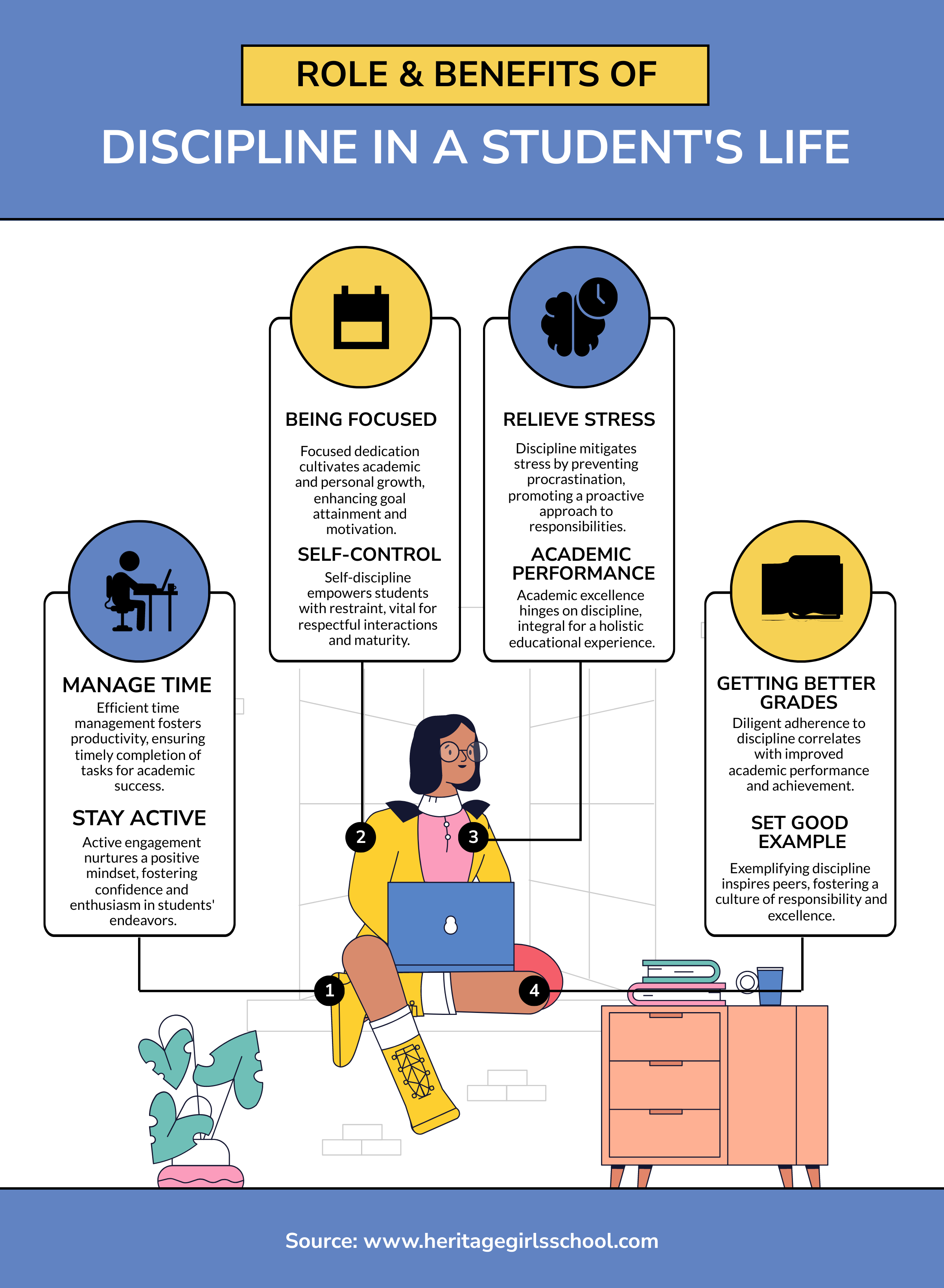In today’s fast-paced world, discipline plays a vital role in achieving success, especially for students navigating the challenges of the post-pandemic era. The value of discipline lies in guiding students to make clear decisions and stay focused on their goals amidst numerous distractions. An essential aspect of discipline is adhering to rules, values, and cultural norms, which not only enhances academic performance but also positively impacts overall well-being.
Schools, teachers, and parents often stress the importance of leading a disciplined life, emphasizing qualities such as punctuality and honesty. A disciplined student is one who conducts themselves with integrity, working diligently towards their aspirations. Cultivating discipline is crucial as it serves as a roadmap to realizing one’s dreams and aspirations, guiding individuals through the distractions of daily life towards meaningful achievements.

Discipline forms the cornerstone of a student’s life, dictating their actions and decisions. It is not merely a set of rules but a valuable tool for personal growth and goal attainment. By cultivating discipline, individuals can navigate distractions and stay focused on their aspirations. The practice of discipline in educational institutions like residential schools is crucial for effective learning and skill development. Through self-control and adherence to values, students learn the art of purposeful living, time management, and productivity, essential for success in any field.
This blog post dives deep into the role of discipline in student life. We’ll explore not only what discipline is, but also how it empowers students to make sound decisions, manage their time effectively, and ultimately, achieve their full potential. By the end, you’ll understand why discipline isn’t just about following rules – it’s about building a strong foundation for a successful and fulfilling future.
What is Discipline?
Discipline is the essential practice of gaining control to ensure adherence to rules, playing a vital role in determining our happiness and success. Developing a disciplined approach involves making lifestyle changes, adjusting working patterns, and implementing effective planning strategies. Despite the challenges, it is achievable and crucial for achieving goals in academics, health, and personal growth. In a student’s life, discipline is key to success and must be cultivated early on. Upholding school rules and maintaining punctuality are important aspects of instilling discipline in students. By aligning oneself with a plan and committing to daily actions, students can enhance their learning capabilities and achieve their objectives in a fixed time. Discipline in student life fosters success, efficiency, and better time management, guiding individuals towards achieving their goals. Embracing discipline is essential for students to excel in various aspects of their lives, ultimately leading to overall growth and success.
Must read: Best Daily Routine for Students
Why is Discipline Important for Students?
Discipline and punctuality are crucial virtues for students, enabling them to steer clear of distractions and stay focused on both short-term and long-term goals. Upholding discipline not only impacts academic success but also enriches life by allowing time for hobbies and extracurricular activities. As Senior IPS Officer Ingit Pratap Singh emphasizes, success is shaped by traits like discipline, perseverance, hard work, and focus.
The recent National Education Policy 2020 recognizes the value of discipline in students’ lives, advocating for sports integration to foster teamwork, self-discipline, and responsibility. Schools play a pivotal role in instilling discipline early on, shaping students into well-rounded individuals. Embracing discipline fosters physical and mental well-being, setting the stage for a flourishing future.
Discipline is the cornerstone of a harmonious society, promoting respect and responsibility. Cultivating discipline not only enhances personal conduct but also contributes to societal order. In various fields, adherence to rules and regulations is paramount, ensuring smooth operations and progress. Effective leaders exhibit disciplined behavior, knowing when to speak and when to listen. Upholding discipline nurtures the mind and heart, shaping individuals into pillars of strength and integrity.
The Role of Discipline in School
In a school setting, a diverse mix of students necessitates a range of teaching strategies to effectively engage all individuals. Maintaining discipline within the school environment is a crucial and multifaceted process that requires a well-structured framework to uphold behavioral standards. When discipline falters, the frequency of suspensions and expulsions rises, leading to challenges in managing classroom dynamics and diminishing the overall quality of education. This deterioration not only disrupts the learning environment but also impacts the morale of dedicated students and teachers. Discipline issues in schools can have lasting academic repercussions for students, a situation further exacerbated by the challenges posed in the post-pandemic landscape. By addressing the critical role of discipline in schools, we aim to shed light on its significance in fostering a conducive learning environment and ensuring academic success for all students.
How has the Pandemic Affected Discipline in Schools?
The pandemic has significantly impacted discipline in Indian schools, with the sudden shift to online learning causing challenges in maintaining focus and engagement among students. The struggle to adapt to virtual teaching methods has been evident, leading to difficulties in re-establishing discipline in offline classes post-pandemic. Teachers faced various challenges in engaging students virtually, highlighting the importance of instilling a disciplined attitude in students’ lives. Exploring ways to foster discipline is crucial in navigating these changes effectively. This article delves into the repercussions of the pandemic on school discipline, offering insights on overcoming these challenges.
Benefits of Discipline in Students’ Life
-
Time Management: Paving Path to Success
Effective time management hinges on a structured and disciplined approach. By cultivating self-discipline, students can navigate their tasks with precision and timeliness. Conversely, neglecting discipline leads to wasted hours on unproductive pursuits. Crafting a well-planned schedule and adhering to it diligently is crucial for success.
-
Stress Reduction: Clear Mind, Bright Future
Adhering to rules in school helps students focus on their studies and responsibilities. Failing to comply leads to procrastination and stress. By prioritizing discipline, students can alleviate distress and pave the way for a successful future. Stay on track for a clear mind and a promising tomorrow!
-
Focus & Distraction-Free Learning: A Student’s Key
Create an optimal learning space for increased productivity and focus. A well-organized study area with minimal distractions boosts student discipline and concentration. Keep it clutter-free, with essential tools handy and technology out of sight. Cultivate a disciplined approach for effective learning outcomes.
-
Single Tasking: Enhancing Concentration Levels
In a world where multitasking prevails, embracing single-tasking is key. Focusing on one task at a time boosts productivity and quality, leading to a happier, stress-free life. Let’s cultivate self-discipline by prioritizing single-tasking. Make the shift for improved efficiency and overall well-being.
-
Self control & Build the Right Mindset
In accordance with ‘Forbes’, fostering the right mindset is key to personal growth and success. Our beliefs about self-discipline and willpower shape our level of determination. As educators/parents, it is crucial to empower students to embrace a growth mindset, nurture a positive self-perception, and enhance their drive to overcome hidden barriers. This approach can lead to transformative outcomes in their personal and academic lives.
-
Motivation & Activity: Fueling Progress Together
Maintaining a disciplined routine is crucial for student motivation. ‘Motivation & Activity: Fueling Progress Together’ emphasizes how a structured approach helps students stay determined and focused amid their hectic schedules.
-
Follow Shcedule to Achieving goals
Encorage students to reach their goals by setting realistic objectives and mastering task prioritization. Emphasize the importance of adhering to guidelines consistently and fostering a collaborative environment among parents and teachers. Encourage everyday diligence and cultivate a proactive mindset to eliminate procrastination. Utilize calendars, planners, or apps to facilitate goal planning and maintain focus. By following a structured schedule diligently, students can pave their path to success effortlessly.
Research shows that individuals who effectively manage their time through structured scheduling are more likely to achieve their goals successfully.
-
Role Model for Others
Exemplifying discipline in various aspects of life can elevate a student as a role model, inspiring others. A disciplined individual radiates a strong and admirable persona, becoming a beacon of inspiration for all.
-
Academic Excellence: Discipline’s Reward
Establishing a consistent study routine enhances academic success. Students benefit from identifying and correcting mistakes to improve grades. Self-discipline plays a key role in steering students towards better performance.
-
Confidence Boost: Empowering Student Voices
Students develop the discipline to follow their routines diligently, prioritizing their long-term growth over temporary distractions. Their unwavering focus on their goals keeps them motivated and committed to their path, ensuring steady progress towards success.
-
Safe Decision-Making Spaces: Encouraging Growth
Students are guided by self-discipline to wisely manage their time, recognizing the impact of their choices on their future. This forward-thinking approach helps them stay focused and avoid the need to make up for lost study opportunities later on.
How to Build Self Discipline in Students?
Developing self-discipline is key to enhancing one’s quality of life. Mastering self-leadership can completely transform your outlook. Authentic discipline goes beyond mere words, profoundly shaping your lifestyle. Positive feelings like joy, enthusiasm, and achievement are all rooted in self-discipline and self-control.
To cultivate self-discipline effectively, consider the following strategies:
-
Recognize Your Strengths and Weaknesses
Understanding your personal strengths and weaknesses empowers you to overcome them. Embracing self-control is the initial step towards building self-discipline.
-
Remove Temptations
The array of temptations in life is vast, but yielding to them is a grave error. By following the adage “out of sight, out of mind,” eliminating major distractions or temptations can boost your self-discipline.
-
Establish New Habits and Routines
Forming fresh habits and routines facilitates the abandonment of old ones. Embracing new habits may seem challenging, but staying positive throughout the process will bring you closer to attaining self-discipline.
-
Self-discipline benefits and importance
Self-discipline is crucial for achieving success in all aspects of life. It helps individuals stay focused, organized, and motivated to reach their goals. By practicing self-discipline, individuals can develop healthy habits, improve time management skills, and enhance productivity. Ultimately, self-discipline leads to greater achievements, better health, and increased self-confidence. Embracing self-discipline is a key ingredient for personal growth and success.
How Does Discipline Affect Learning?
A disciplined student embodies confidence through the ability to maintain control over their life, leading to a profound sense of relief and satisfaction that nurtures self-assurance. This self-assurance significantly impacts the student’s learning journey, allowing them ample time and focus to enhance their educational experience.
Moreover, a disciplined student embraces new challenges and routines with enthusiasm, paving the way for a more dynamic approach to learning. By fostering a mindset open to exploration and growth, disciplined students unlock a world of possibilities that positively influence their learning patterns.
In essence, the correlation between discipline and confidence in students is a powerful synergy that propels them towards academic excellence. By instilling a sense of control and readiness for new experiences, students can harness their full potential, making strides in their educational pursuits and personal development.
Speech on Value of Discipline in Student Life
It is crucial for children to learn discipline early on in their lives, with parents guiding them in developing self-discipline and self-control. Discipline enables children to resist temptations, delay gratification, and endure discomfort to achieve their goals successfully.
Children are quick learners and often emulate the behavior they observe, whether positive or negative. Parents serve as role models for their children in cultivating self-discipline. Therefore, parents who exhibit traits like procrastination and laziness cannot expect their children to be self-disciplined. Setting a good example and emphasizing the importance of discipline in life are key responsibilities for parents.
In the school environment, the principal and teachers play a vital role in fostering discipline. Students can practice discipline by adhering to school rules such as wearing a clean uniform, showing respect to teachers, completing tasks promptly, and maintaining a neat appearance. Cultivating discipline from a young age helps students stay organized and ultimately leads to success in various aspects of life.
Addressing indiscipline in students should not solely rely on punishment or strict penalties. Discipline is a learned behavior influenced by the environment, including parental and educational guidance. Parents must instill discipline by being disciplined themselves and monitoring their child’s activities to understand their needs better.
In conclusion, self-discipline is a fundamental trait for student success. Developing self-discipline and self-control early in life empowers students to plan effectively and achieve their goals. By fostering these habits, students can navigate life’s challenges and increase their chances of success in the future.
what is the importance of discipline in students life in 10 lines
- Discipline entails training oneself to adhere to rules and maintain systematic habits.
- It reflects self-control and manifests in an individual’s actions.
- Genuine discipline isn’t just about obedience to authority; it’s spontaneous and independent.
- Discipline empowers children to resist temptations, delay gratification, and endure discomfort to achieve their goals.
- Parents who model discipline instill its value in their children’s lives.
- In schools, both the principal and teachers play pivotal roles in fostering discipline.
- School discipline encompasses simple acts like wearing clean uniforms and respecting teachers.
- Early exposure to discipline helps students stay organized, paving the path for success.
- Self-discipline fosters the ability to plan effectively and achieve goals.
- Developing self-discipline from a young age empowers students to navigate life’s challenges effectively.


